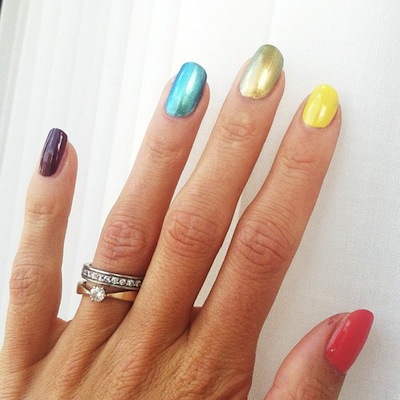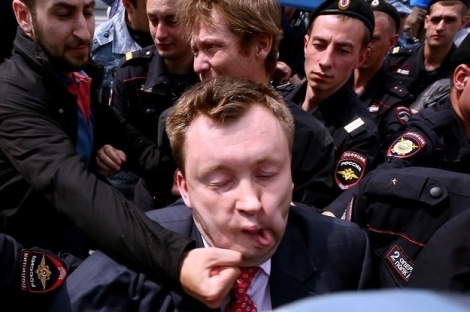Fewer than six months from now, the 2014 Winter Olympic Games are scheduled to take place in Sochi, Russia. Russia, already under criticism for the rigid censorship being imposed by the increasingly authoritarian rule of President Vladimir Putin, has recently passed legislation against those who spread “propaganda of non-traditional sexual relations” (however that may be interpreted by the corrupt government, or their Orthodox vigilante supporters). People across the world were aghast when Russian Sports Minister, Vitaly Mutko, asserted that they planned to enforce this legislation during the upcoming Olympics, on Russians and foreigners alike (although he recently has made a public statement trying to backpedal on the issue and blame the Western media for causing much ado about nothing).

Tregaro, a Swedish high jumper recently painted her nails rainbow colors while competing at the world championships this weekend. Her and her teammates’ small protest elicited ire from Russian athlete Yelena Isinbayeva, who said Tregaro’s actions were disrespectful to Russia. Tregaro recently complied with the Swedish track and field federation’s request that she repaint her nails, as political displays are against the rules.
So now, the question is, what to do? Autostraddle.com has put together a very thorough rundown of the various options that have thus far been proposed. My favorite option, though unfortunately the least likely at this point, is for the International Olympic Committee (IOC) to take responsibility for their choice of where to hold the games, and move them out of Russia. (Many have suggested Vancouver, the most recent city to host the Winter Olympics, as the most viable option for a relocation.) If this were to happen, the IOC would be acknowledging that their allegedly apolitical decisions do not, in fact, exist in a vacuum. The call to move the Olympics to Vancouver has been supported by many prominent figures including British actor Stephen Fry, who penned a letter of protest to British Prime Minister David Cameron and the IOC in which he feelingly implores them to
resist the pressures of pragmatism, of money, of the oily cowardice of diplomats and to stand up resolutely and proudly for humanity the world over, as your movement is pledged to do. … Be brave enough to live up to the oaths and protocols of your movement.
Fry’s frustration is with the hypocrisy of the IOC, which operates under the Olympic Charter which is simultaneously committed to “[placing] sport at the service of humanity and thereby to promote peace” (point 4 of the IOC’s mission), while also prohibiting any “kind of demonstration or political, religious or racial propaganda … in any Olympic sites, venues or other areas” (Rule 50). This double standard is precisely the problem: at best, it is blindly ignorant and naive, and at worst, it provides a platform for the host country to propagandize a corrupt regime, while silencing any dissent. In effect, the IOC’s decision of where to hold the Olympics functions as an endorsement of that country’s regime – a concern which was also the reasoning behind Judge Jeremiah Mahoney’s call for America to boycott the 1936 Berlin Olympics.
Despite the fact that Russia has forbidden displays of LGBTQ activism, and, therefore, so too has the IOC, Russian activists are actually encouraging people not to boycott the Games, hoping to use the global spotlight and solidarity from the masses to their advantage.

(Andrey Svitailo/ Getty Images) Prominant Russian LGBTQ activist, Nikolai Alexeyev, is beaten and detained during a protest in Moscow earlier this year. Alexeyev has been vocal about encouraging protests and political pressure as opposed to boycotts, and is one of Buzzfeed’s people to watch as the Sochi Olympics approach (http://www.buzzfeed.com/saeedjones/who-to-watch-as-sochi-approaches).
Although many conversations about the Olympics taking places in Sochi have centered on speculation about how strictly Russia’s laws will be enforced, that is not my main concern. It would not be a prudent political move for Putin to enforce them rigorously, especially if there are massive protests. Therefore, I’m more concerned that the laws will not be enforced, allowing Putin the opportunity to perpetuate the image of himself as a leader committed to peace.
The parallels have been drawn, and this situation is, of course, reminiscent of the 1936 Berlin Olympics, in which Hitler temporarily downplayed his antisemitic agenda during the course of the Games. The Games in particular provided Hitler with the opportunity to showcase Germany at its best, to fashion himself as a leader interested in fostering good international relations, and to make himself appear innocuous, sharing pursuits and interests (sports) in common with the masses.
One particularly revealing artifact we can analyze today (conveniently available for free on YouTube in just 11 parts!), is Leni Riefenstahl’s film, Olympia. Infamous for her footage of the Nazi Party Congress in Nuremberg in 1934, Triumph of the Will, Riefenstahl was a close friend of Hitler’s, and was sought out by him to create a documentary of the 1936 Olympics. This epic, two-part film, which combines footage and commentary of the competitions along with romantic, sweeping contextual scenes, has also been criticized as Nazi propaganda, despite the fact that it may not seem blatantly so.
However, the fact that it purports to be neutral and straightforward is the very thing that makes it so insidious in its championing of fascist ideals. Olympia is cheerful and celebratory of the pleasure and pride in a united global community. It does not focus on intense German patriotism, but rather humbly praises Hitler’s role in bringing these diverse nations together – a disingenuous presentation, to say the least.
![(Anonymous/Public Domain) "Riefenstahl [maintained] in interviews since the 1950s that both Olympics films were commissioned by the International Olympic Committee, produced by her own company, and made over Goebbels’s protests. The truth is that the films were commissioned and entirely financed by the Nazi government ... and facilitated by Goebbels’s ministry at every stage of the shooting. … Even the plausible-sounding legend of Goebbels objecting to her footage of the triumphs of the black American track star Jesse Owens is untrue. For this film, like the previous ones, Riefenstahl had Goebbels’s full support." (Susan Sontag, "Fascinating Fascism")](https://appliedsentience.com/wp-content/uploads/2013/08/russia-4.jpg?w=336&h=461)
(Anonymous/Public Domain)
“Riefenstahl [maintained] in interviews since the 1950s that both Olympics films were commissioned by the International Olympic Committee, produced by her own company, and made over Goebbels’s protests. The truth is that the films were commissioned and entirely financed by the Nazi government … and facilitated by Goebbels’s ministry at every stage of the shooting. … Even the plausible-sounding legend of Goebbels objecting to her footage of the triumphs of the black American track star Jesse Owens is untrue. For this film, like the previous ones, Riefenstahl had Goebbels’s full support.” (Susan Sontag, “Fascinating Fascism”)
Susan Sontag elaborates on this issue in her notorious critique of Riefenstahl, “Fascinating Fascism”:
In Olympiad [sic], the richest visually of all her films, one straining scantily clad figure after another seeks the ecstasy of victory, cheered on by ranks of compatriots in the stands, all under the still gaze of the benign Super-Spectator, Hitler, whose presence in the stadium consecrates this effort. (Olympiad, which could as well have been entitled Triumph of the Will, emphasizes that there are no easy victories.)
Throughout the decades after the war, Riefenstahl (who died in 2003 at the age of 101) defended her films and her innocence by claiming that her interest first and foremost was “beauty” – as something distinct and divided from politics. Maintaining the alibi of her obliviousness to Hitler’s true actions throughout her lifetime, she shirked responsibility for the propagandistic power of her films by asserting that they were documentaries that merely captured what happened to be in front of the camera. This was, after all, completely false, and she later contradicted her own assertions that “not a single scene” in Triumph of the Will was “staged”, when she admitted that, in fact, everything about the rally had been organized for the “convenience of the cameras”. This fact is true also of Olympia, which employed the use of dozens of cameras, and for which special tracks and trenches were built in order to accommodate Riefenstahl’s unique and groundbreaking camera angles.
This, above all, shows that aesthetics and sports are not quite as innocuous as they may seem, and it is in no way a stretch to assume that Putin will take similar advantage of the opportunity for mass propaganda in favor of his politics. Pleasing aesthetics can often be used to mask power, a point that Russian artist Vasiliy Slonov has highlighted with his recent exhibition, “Welcome! Sochi 2014” in which he transforms the cutesy Olympic mascots into malformed, sneering, violent creatures.

(Vasiliy Slonov) Russian gallery curator, Marat Guelman, was recently fired after refusing to censor the controversial artwork of Vasiliy Slonov in an exhibition entitled “Welcome! Sochi 2014” at the Perm Museum of Contemporary Art.
Neither art nor the Olympics are apolitical. The location of the games, and the modes of expression permitted within that region are of the utmost significance. If the upcoming Winter Olympics are going to be held in Sochi, we must go forward with critical awareness of the actions and behavior of both Putin and the IOC. Not only out of concern for the safety of our athletes and attendees, but out of disapproval of the IOC’s (inadvertently?) setting an ideal stage for Putin to disseminate authoritarian propaganda that will mask the dangerous and violent conditions under which many Russians live every day.
Emma Waldron (Staff Writer, Rutgers University)Emma Waldron is a Rutgers alumna and currently works with first-year students as an academic advisor. She spent her formative years in Boulder CO before relocating to the Garden State, and recently spent a year living in Bristol, England where she completed her MA in Performance Research. Her research focuses on the concept of authentic identity, and her dissertation addressed issues of gender and musical performativity in Hedwig and the Angry Inch. Emma has recently become vegan, and documents the transformation on her blog “I Am What I Eat”. Emma spends a lot of time thinking about Judith Butler, iambic pentameter, vegan cookies, Ralph Waldo Emerson, sunshine, drag queens, Nordic larp, and tea.
Very well written and interesting article, I really enjoyed reading it. Like you say the Olympics cannot be seen as apolitical. If, as it seems, the Winter Olympics will continue to go ahead in Sochi then not only is the IOC endorsing Putin’s increasingly repressive regime, but they are also providing Putin with an opportunity to showcase Russia to the rest of the world in an attempt to gain foreign investment whilst downplaying attacks on human rights.
LikeLike